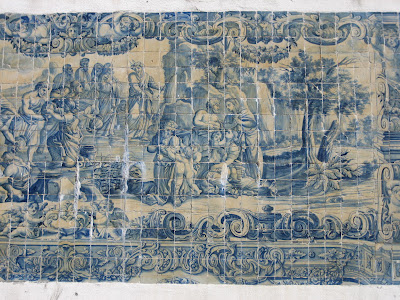André Chastell: The Sack
of Rome
In 1527, the most Catholic King, Defender of the Faith, Bulwark of
Christianity and of the Apostolic Roman Church, Charles V, Holy Roman Emperor,
sent his Spanish tercios into Rome
with the orders to destroy the place and massacre its inhabitants. He had a
tiny little dispute with the reigning Pope over something or other, and the
marginal fact that both were devout Catholics, and that His Majesty pretended
to defend the Church against all comers was not considered an objection against
such a nice little punitive expedition.
Now if you think that Mr Chastel’s book must consequently be a work
full of blood, gore, rape and misery, you are wrong. This, after all, is the
Renaissance, where cruelty and refinement, atrocity and art, grossness and
sophistication, go hand in hand like infatuated lovers. And that is what you
get: a picture of the age in all its aspects, paradoxical, fascinating, mind
boggling and complete. I don’t think I have ever read a more comprehensive
portrait of that brilliant, yet repulsive age.
Peter Missler: The
Treasure Hunter of Santiago
History is full of madmen, but some of them were shocking air-heads
on top of that. The worst of those are surely found among the hordes of
treasure-seekers which have inhabited every age and every land. Of course,
hidden treasure does exist. But the number of deluded, obsessive, idiotic and
sheer crazy treasure hunters – men and women who sacrificed everything for the illusion
of easy, instant riches – is a thousand times greater than all the hoards of
gold ever entrusted to the earth. Mr Missler digs into the tale of a single one
of these, the Swiss soap-boiler Benedict Mol, who went to Santiago de
Compostela in 1838, sponsored by the Spanish Minister of Finance (!!), to
discover a grand treasure sunk by Napoleonic soldiers into the cesspool of a
hospital for syphilitics. Those who like reading of mankind’s March of Folly
will thoroughly enjoy this one!
Para leer una reseña en Español, haga click aqui
Para leer una reseña en Español, haga click aqui
Hard copies and Kindle versions: click HERE
Jerome Carcopino: Daily
Life in Ancient Rome
I often wondered if, perhaps, all the archaeologists who knew how to
write an elegant sentence had died tragically in the First World War. For the
shortage of such scholars in the period which followed that inferno is truly
shocking. Where giants such as Gibbon, Mommsen, Burckhardt and Prescott reigned
supreme in the 18th and 19th century, in the 20th,
the field was taken over by the likes of Stuart Piggott and Marshall Sahlins:
bookkeepers who dabble in historical reporting and who manage to chill and kill
even the most exciting narrative. Fortunately, from time to time, one discovers
a lone soul who still knows how to paint the portrait of an age with flair,
insight and human warmth. Mr Carcopino is one such man. His treatment of life
in the Augustan age of Rome reads as if he were an eyewitness; and it is so
complete, so feeling, so amazing that you come away as if you had spent a two
month holiday in the place. An absolute Must for anyone who still understands
that the Splendour of Rome has much to teach and tell us moderns!
Juan Campos Calvo-Sotelo:
Naufragos de Antaño
Here is one for those who love the sea, who think of England with
their eyes closed, and who enjoy the catastrophes suffered by others, while in
the comfort of their well-heated, well-provided drawing room. Mr Campos – who
himself famously suffers from sea sickness, yet threw himself into maritime
history (a sure indication of his exquisite sense of humour) – took half a
decade to research a dozen British shipwrecks on Spain’s north-western coast
(the aptly named ‘Costa da Morte’, or ‘Coast of Death’), coming up with not
only the bare story of each disaster, but with a veritable treasure trove of
anecdotes and unknown facts about the ships, the crews, the traditions and the
psychology of every man and woman involved. If you happen to read Spanish, this
is one instructive and amusing book to take with you to the beach!
Available on the internet: click HERE
Henri Focillon: El Año Mil
Published 952 years after the year it describes, and strangely 7
years after the author’s death, this precious little book has been near
forgotten for half a century; to such an extend that I never managed to buy a copy
in the original French! Which only goes to show that genius is rarely
recognized or acknowledged for its true worth. In just about 200 lightly
printed pages, Mr Focillon reconstructs the feel, the facts and all the facets
of that One Ominous Year which was the watershed of the Middle Ages, which made
all the difference, which marked the Before and the After for generations of
men. NOT the kind of reading for those who think David Beckham is an important
person, that the recent Olympics were an expression of good taste, or that
Saatchi & Saatchi are patrons of the arts on a par with Lorenzo de Medici.
But regular readers of Metis Meets Mittington may wish to
take a look at Mr Focillon’s splendid tour
de force…
METIS MEETS MITTINGTON
WILL BE BACK IN MID SEPTEMBER !!!


















